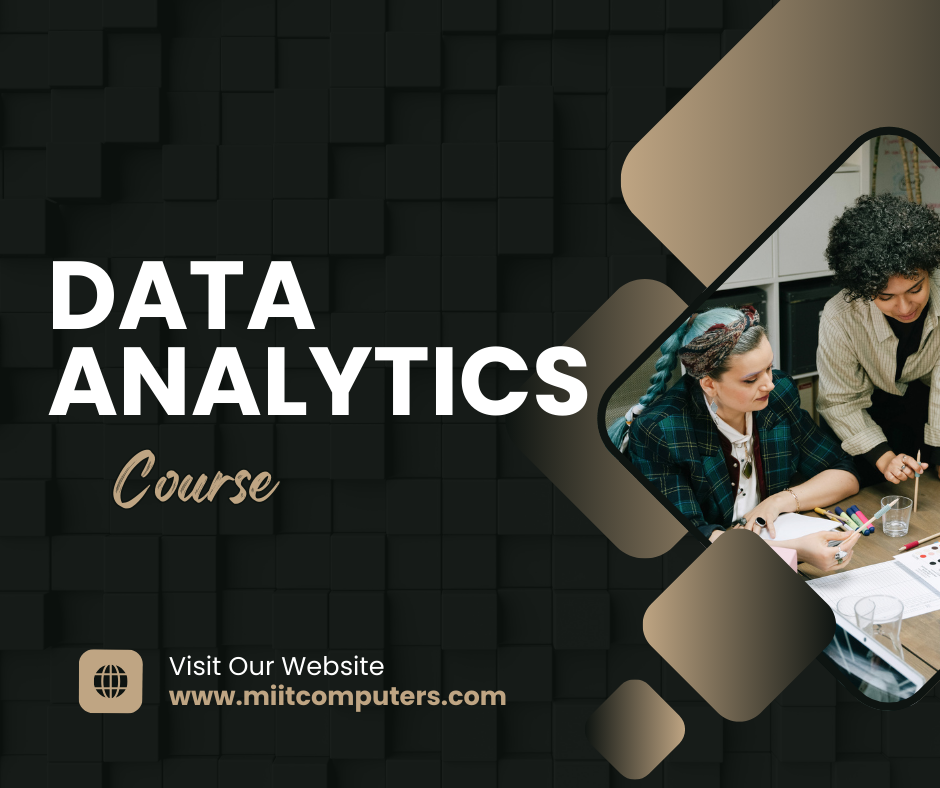Data Analytics online courses provide a comprehensive and practical pathway to mastering the art and science of extracting valuable insights from data. These programs are designed for individuals looking to launch a career in the rapidly growing field of data, or for professionals across various industries seeking to enhance their decision-making capabilities with data-driven strategies. Data Analytics Course In Hayathnagar Hyderabad.
What is Data Analytics?
Data analytics is the process of inspecting, cleansing, transforming, and modeling data with the goal of discovering useful information, informing conclusions, and supporting decision-making. It involves a systematic approach to explore data, identify patterns, and communicate findings in a clear and actionable manner.
Key Topics Covered in Data Analytics Online Courses:
These courses typically cover a blend of theoretical concepts and hands-on application, equipping learners with a diverse skill set. Common modules and topics include:
1. Foundations of Data Analytics: * Introduction to the data ecosystem, data types, and the role of a data analyst. * Understanding the data analysis process (e.g., Ask, Prepare, Process, Analyze, Share, Act). * Data ethics, privacy, and responsible data handling.
2. Data Collection and Preparation: * Data Sourcing: Identifying and acquiring data from various sources (databases, spreadsheets, web). * Data Cleaning & Preprocessing: Handling missing values, outliers, inconsistencies, and duplicates. Techniques for data transformation and validation. * Data Management: Introduction to databases, data warehousing, data marts, and data pipelines.
3. Statistical Foundations for Data Analysis: * Descriptive Statistics: Measures of central tendency (mean, median, mode), measures of spread (variance, standard deviation), and data distribution. * Inferential Statistics: Hypothesis testing, correlation, regression analysis, and sampling distributions. * Probability: Understanding basic probability concepts relevant to data analysis.
4. Core Data Analysis Tools and Languages: * Spreadsheets (e.g., Microsoft Excel, Google Sheets): * Advanced formulas, pivot tables, data validation, conditional formatting. * Data preparation, basic statistical analysis, and dashboard creation. * SQL (Structured Query Language): * Fundamentals of relational databases and database design. * Writing queries for data retrieval, manipulation (INSERT, UPDATE, DELETE), and aggregation (JOINs, GROUP BY, subqueries). * Advanced SQL concepts like window functions and common table expressions (CTEs). * Programming Languages for Data Analysis (e.g., Python, R): * Python: Introduction to Python syntax, data structures. Key libraries like Pandas (for data manipulation and analysis), NumPy (for numerical operations), Matplotlib and Seaborn (for data visualization). * R: Fundamentals of R programming, data structures, and packages like Tidyverse (dplyr, ggplot2) for data manipulation and visualization. * Exploratory Data Analysis (EDA): Using Python/R to explore datasets, summarize characteristics, and identify patterns.
5. Data Visualization and Storytelling: * Principles of Effective Data Visualization: Choosing appropriate chart types (bar charts, line charts, scatter plots, pie charts, etc.). * Data Visualization Tools (e.g., Tableau, Power BI): * Connecting to various data sources. * Creating interactive dashboards and reports. * Learning advanced features like calculated fields, parameters, and storytelling. * Data Storytelling: Communicating insights clearly and compellingly to non-technical stakeholders through narratives, visuals, and presentations.
6. Advanced Topics (often in more comprehensive courses): * Predictive Analytics & Introduction to Machine Learning: Basic concepts of supervised and unsupervised learning, regression models, classification algorithms (e.g., linear regression, decision trees, clustering). * Cloud Platforms for Data: Introduction to cloud services for data storage, processing, and analytics (e.g., AWS, Azure, Google Cloud). * Big Data Concepts: Overview of Hadoop, Spark for handling large datasets.
Key Features of Online Data Analytics Courses:
- Flexible Learning: Self-paced modules, pre-recorded lectures, and live online sessions cater to diverse schedules.
- Hands-on Projects: Emphasis on practical application through real-world case studies and capstone projects to build a strong portfolio.
- Industry-Relevant Tools: Training on popular tools like Excel, SQL, Python, R, Tableau, and Power BI.
- Expert Instructors: Learning from experienced data professionals and industry veterans.
- Career Support: Many programs offer resume building, interview preparation, and job placement assistance.
- Certification: Upon successful completion, learners often receive a certificate, validating their skills and enhancing their professional profile.
- Community and Support: Access to discussion forums, peer learning, and sometimes direct mentor support.
Who Should Enroll?
Data analytics courses are ideal for:
- Career Changers: Individuals from non-technical backgrounds looking to transition into a high-demand tech role.
- Graduates: Recent graduates seeking specialized skills to make them job-ready.
- Business Professionals: Managers, marketers, finance professionals, and anyone needing to leverage data for strategic decision-making.
- Aspiring Data Scientists: A data analytics course provides a strong foundation before delving into more advanced data science and machine learning concepts.
By completing a data analytics online course, you’ll gain the analytical mindset and technical proficiency required to transform raw data into actionable intelligence, driving business growth and innovation.

Data Analytics Course - Frequently Asked Questions
The most common and essential tools you’ll learn include:
- Spreadsheets: Microsoft Excel, Google Sheets (for data cleaning, basic analysis, and reporting).
- SQL (Structured Query Language): For querying and managing data in relational databases.
- Programming Languages:
- Python: Widely used with libraries like Pandas (data manipulation), NumPy (numerical computing), Matplotlib, and Seaborn (visualization).
- R: Popular for statistical analysis and graphical representation.
- Data Visualization Tools: Tableau, Microsoft Power BI (for creating interactive dashboards and reports).
Yes, absolutely. Data analytics is a booming field with consistently high demand across various industries (tech, finance, healthcare, e-commerce, marketing, etc.). As businesses continue to rely heavily on data-driven decision-making, the need for skilled data analysts who can extract actionable insights will only grow. The role is constantly evolving, offering diverse opportunities and strong career growth.
Salaries in India vary based on experience, skills, location, and company. As of May 2025:
- Entry-level (Fresher): Typically ranges from ₹3 Lakhs to ₹6 Lakhs per annum.
- Mid-level (3-5 years experience): Can range from ₹6 Lakhs to ₹12 Lakhs per annum.
- Experienced professionals (5+ years and Senior roles): Can earn ₹8 Lakhs to ₹18 Lakhs per annum, with leadership roles potentially exceeding ₹20-30 Lakhs per annum. Cities like Bangalore, Pune, and Hyderabad often offer higher salaries due to the concentration of tech and IT companies.
A strong portfolio is crucial. It demonstrates your practical skills and ability to apply analytical techniques to real-world problems. Most good online courses will guide you through capstone projects or assignments that can become portfolio pieces. You can also build your portfolio by:
- Working on public datasets (e.g., Kaggle).
- Participating in data challenges.
- Analyzing publicly available business data (e.g., company reports).
- Creating visualizations and reports on topics you’re passionate about. Each project should include a clear problem statement, the data used, the analysis steps, the tools used, and the insights gained.
What Are You Looking For? Come Join Us!
